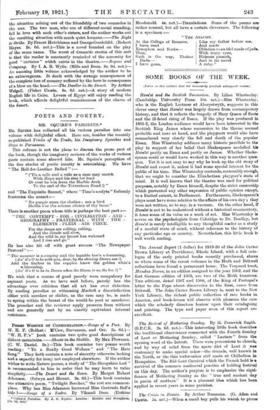POETS AND POETRY.
MR. SQUIRE'S PARODIES.*
Ma. SQUIRE .has collected all his various parodies into one volume with delightful effect. Here are, besides the recently re-published Tricks of the Trade, his Imaginary Speeches and Steps to Parnassus.
This column is not the place to discuss the prose part of the book, though the imaginary reviews of the works of various poets contain some shrewd hits. Mr. Squire's perception of the fine shades of poetio inanity is astonishing. We have " The Hell-for-Leather Ballad " :—
" ('Tis a mile and a mile ass man may march With Hope and-his sins for load. Or ever he win from the Marble Arch.
To the end of the Tottenham Road 1) " and "The Exquisite Sonnet," where "Time's acolyte" forlornly frustrates the sunset :—
" No jairple mars the chalice ; not a bird
Shrills o'er the solemn silence of thy fame."
There is another poem whose title is perhaps the best. part:—
"THE CONTEMPT - FOR - CIVILISATION - AND GEOGRAPHY - FRATERNAL - WITH - THE - ELEMENTS - PLEIN - MR PIECE.
For the deeps are calling, calling, And the clouds sail slow, And the wild in my breast has wakened And I rise and go."
He has also hit off with great success "The Newspaper Pastoral" :—
" The summer is a-coming and the bumble bee's a-humming, (An' it's 0 to be with you, dear, by the shining Devon sea l)
And the finches in the coppice know the golden whim's a-blooming,
(An' it's 0 to be in Devon when the bloom is on the bee I)"
We wish that a course of good parody were compulsory for aspirant poets.. As we have said before, parody has • the
advantage over criticism that all art has over didactics. By reading parodies or witnessing Macbeth a dissatisfaction either with murders or clich4s, as the case may be, is made to spring .within the breast of the would-be poet or murderer.
The preacher and the reviewer apply pressure from without and are generally met by an exactly equivalent internal resistance.


































 Previous page
Previous page